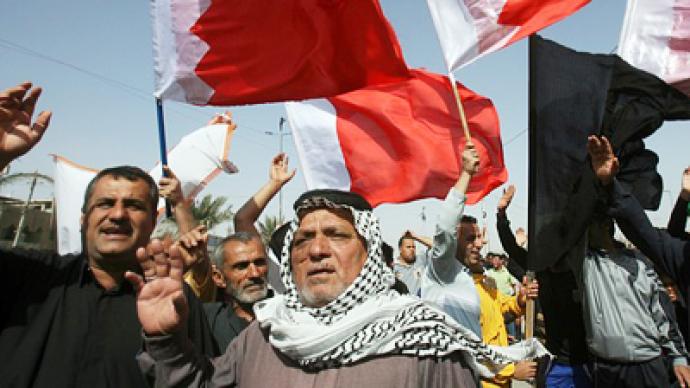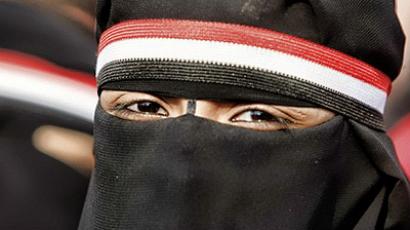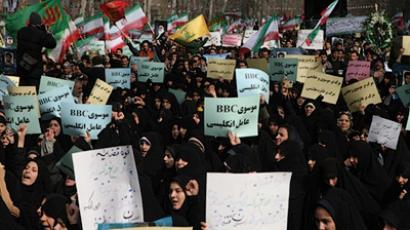Bahrain bleeds from American bullets

In Bahrain the monarchy, now with the help of its neighbors in Saudi Arabia and the UAE, continues to violently crackdown on anti-government protesters. Meanwhile, the US remains focused on Libya, overlooking violence at the hands of its ally.
The Bahraini government has arrested top political opposition figures and yet the US imposed economic sanctions against Libya and pushed for military options in response to reported violence at the hand of the government against the opposition there. Why do we hear so little from US President Barack Obama in response to the unrest in Bahrain?“God is great,” is the Arabic translation of the final words of a purported peaceful protester in Bahrain, captured on video. That was before he appears to be shot, allegedly by Bahraini security forces.Since martial law was declared this week the Bahraini government has cracked down on pro-democracy protesters clearing them out of Pearl Square where they have been demonstrating.And viral videos, though the details of them cannot be confirmed, have been surfacing on the Internet appearing to show police shooting protesters, in some cases point blank. It is reminiscent of another uprising against an autocrat… in Libya.When images and reports of violence against protesters at Gadhafi’s hand in Libya reached the US we saw the president take a stand.“The violence must stop,” Obama said publicly. Moammar Gadhafi must "step down from power and leave.”Obama sent humanitarian aid and warships in that direction, and early on he demanded a plan for a No-Fly Zone. The UN Security Council has since taken the lead. Meanwhile, the US imposed tough economic sanctions freezing Libya out of the US banking system and there are reports the US has played a more covert role underway in the North African conflict.“An opposition that the CIA has funded for 30 years is now holding the city of Benghazi,” said Sara Flounders, co-founder of the International Action Center in New York.According to people in direct contact with activists on the ground in Bahrain, the Bahraini people are begging for help from the US, too.“They use the language of being rescued from their own government,” said Toby C. Jones, author and history professor at Rutgers University who lived and worked in Bahrain and is in touch with many activists still in the country. “The people on the ground understand the only country that has leverage is the United States.”The US has a military base in the island nation, the navy’s powerful fifth fleet and six thousand troops are stationed there. In response to the brutal crackdown, the US president has wielded his authority, to pick up the phone and call to the king of Bahrain.“The President expressed his deep concern over the violence in Bahrain and stressed the need for maximum restraint,” recounted Jay Carney, White House press secretary of the call.Words the forces on the ground, now backed by 1000 Saudi Arabian troops, don’t appear to be listening to. Critics said the talk doesn’t amount to any help for the people it amounts to a “double standard,” according to journalist Wayne Madsen and several others interviewed for the story.A double standard in the way the US deals with friend versus foe. Unlike Libya, Bahrain is a strong US ally in the oil-rich Persian Gulf. “It’s all about oil and all about geo political military strategy,” said Madsen. “The US has a lot of military assets in the Persian Gulf right now and they want to make sure they stay there.”US interests coming at the cost of people’s lives and at the cost of the values of human rights and democracy the US claims to care so much about."Bahraini blood is somehow worthless and Libyan blood is more important,” said Husain Abdulla, director of the Americans for democracy and human rights in Bahrain, comparing the US reaction Libya versus Bahrain. “It's just a hypocritical stand that goes against everything we believe-in in this country."“You’re looking at American military Apache helicopters attacking people in the capital of Bahrain that’s where the US stands on the issue,” believed Rick Rozoff, blogger and CEO of Stop NATO.














